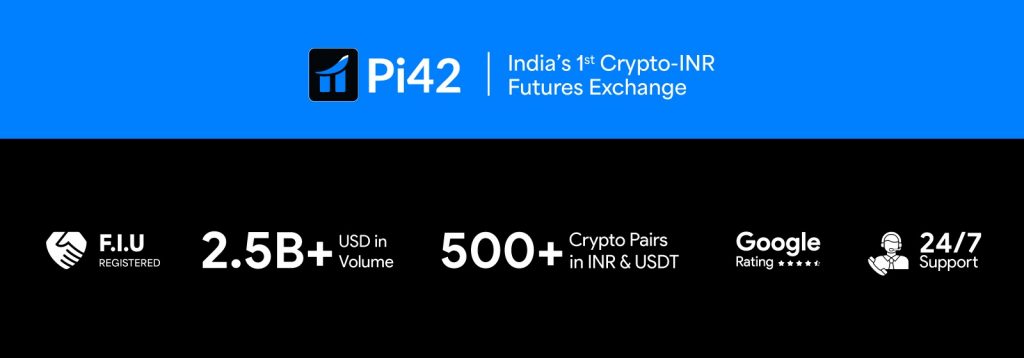Contract trading, also referred to as margin trading, is a way to use your capital more effectively by allowing you to trade larger positions with a smaller initial investment. It has become popular because of the potential for big returns, but it’s important to remember that it comes with its risks. At Pi42, we’re all about giving you the right tools and opportunities to explore contract trading with multiple cryptocurrencies, so you can make the most of it while staying informed.
What is Contract Trading in Crypto?
Contract trading in crypto is when you trade an agreement instead of the actual cryptocurrency. This agreement, called a trading contract, lets you decide in advance whether you’ll buy or sell an asset like Bitcoin at a set price in the future. In crypto derivatives, you don’t own the coin itself, you own a contract that follows the coin’s price. So, if Bitcoin’s value changes, your contract’s value changes too. This makes it possible to trade on price movements without needing to hold the crypto in your wallet.

At Pi42, contract trading crypto gives traders the advantage of leverage, allowing them to access more capital from the exchange compared to their initial investment. This increases the potential for higher profits. Traders can choose their leverage level, from 2x to 100x, giving them full control over their risk and reward. With its flexibility, ease of use, and advanced features, Pi42 stands out as one of the best crypto contract trading platforms for both beginners and experienced traders.
Another exciting feature of a trading contract is leverage. Leverage trading refers to capital borrowed from the exchange, which is used to increase the trader’s position. For instance, in such a case, a trader with $1,000 can trade a position worth $10,000, using 10x leverage. However, while it does amplify profits, leverage can also do the same with losses; therefore, the trader needs to manage risk.
What is Bitcoin Contract Trading?
BTC contract trading simply relies on contracts based on the value borrowed from Bitcoin. It should be observed that in contrast to the spot trade, in which stakes in the actual ownership of Bitcoin are placed, it is different in the case of these contracts, which float according to Bitcoin’s move against spot valuation. This is very useful, especially for those who are looking forward to gaining from the volatile price of Bitcoin without actually having an asset in hand.
For example, one trader on Pi42 has to invest 1 BTC; say, for this current deal, the price is $24,000, but then they only have $400 in their account. At 100x leverage, they would be trading with 1 BTC of capital. What this means is they are borrowing the difference of $23,600—more than 60 times their capital. This increases their profit potential, but also their risks and the potential losses if liquidation occurs.
This is one characteristic that makes Bitcoin contract trading extremely optional on Pi42. First, it allows traders to go long or short. When one goes long, they simply anticipate that the price of Bitcoin will rise, whereas short means that one anticipates a downtrend in the price. This kind of flexibility enables traders to profit from both bull and bear markets.
Second, Bitcoin contract trading opens up an opportunity for hedging. For doing modifications with protection from unhealthy price movements, they can utilize the contracts to hedge their spot positions. For instance, a trader with Bitcoins in a spot account and expecting the price to drop can go short in his account through a contract for hedging purposes.
How Contract Trading in Crypto Works
In contract trading crypto, you don’t directly buy or sell the cryptocurrency itself. Instead, you trade contracts that track the price of the asset, such as Bitcoin or Ethereum. These contracts can be used to speculate on price movements, whether the market goes up or down, without actually owning the crypto in your wallet.
Here’s how it works:
- Choose a Contract Type: Pick between crypto futures or crypto options, depending on your trading strategy.
- Set Your Position: Go long (buy) if you expect the price to rise, or go short (sell) if you expect it to fall.
- Use Leverage: Increase your exposure by trading with more capital than you invested, multiplying both potential profits and risks.
- Settle the Contract: At the contract’s expiry (or before, in the case of options), the trade is closed, and you either receive or pay the difference based on market price changes.
This flexibility allows traders to benefit from both rising and falling markets while using risk management tools to protect their capital.
Types of Contracts in Crypto Trading
When trading crypto contracts, you can choose between futures and options. Both let you speculate on prices without owning the actual asset, but they work differently.
Crypto Futures Contracts – Fixed Commitment
A crypto futures contract is a binding agreement to buy or sell a cryptocurrency at a fixed price on a specific future date.
- How it works: If the price moves in your favor, you make a profit; if it moves against you, you incur a loss.
- Example: You agree to buy 1 BTC at $60,000 in three months. If Bitcoin rises to $65,000, you earn the difference.
- Best for: Traders with higher risk tolerance who actively monitor the market.
Crypto Options Contracts – Flexible Rights
A crypto options contract gives you the right, but not the obligation, to buy or sell a cryptocurrency at a set price before or on a certain date. You pay a premium for this flexibility.
- How it works: If the market moves in your favour, you can exercise the option to secure a profit. If not, you can let it expire, losing only the premium paid.
- Example: You buy an option to purchase BTC at $60,000 within a month. If BTC rises to $65,000, you can buy at $60,000 and sell at $65,000.
- Best for: Traders who want to limit potential losses while staying open to profit opportunities.
Benefits vs Risks of Contract Trading in Crypto
| Benefits | Risks |
|---|---|
| Profit from both rising (long) and falling (short) markets | High volatility can lead to rapid losses |
| Leverage increases potential returns | Leverage also magnifies losses beyond your initial margin |
| No need to own or store the cryptocurrency | Liquidation risk if the market moves against your position |
| Hedge existing crypto holdings to reduce risk | Requires good knowledge of trading strategies and contract types |
| Flexible trading strategies — short-term or long-term | Emotional stress from fast-changing market conditions |
| Access to multiple cryptocurrencies and contract types for diversification | Not suitable for traders unwilling to take on higher risk |
Crypto Derivatives Market Size and Its Impact on Contract Trading
The market of crypto derivatives is ballooning, as it records trading volumes of over $100 billion per day on all presently available crypto trading platforms. Pi42 has a massive contribution to this arena, taking it to the first rankings of crypto derivatives exchanges globally. Very importantly, the Bitcoin derivatives market holds more than 50% of the total crypto derivatives market—a fact underlining its dominance and the interest it brings about among traders.
According to 2021 data, the turnover ratio for crypto derivatives surpassed spot trading, which, became a reality for the first time in the history of these types of trading. The global derivatives market for equities, forex, and precious metals surpasses $1 quadrillion, which causes space for the further expansion of the crypto derivatives market to be really huge.
The latter provides various advantages over spot trading. The most important thing is that they offer higher leverage, which means that a trader can use too much lower capital to initiate control over a large-sized position. It, in turn, brings the potential for higher success but higher risks. Different derivatives allow speculation on cryptocurrency movements without actually holding these cryptocurrencies. It surely is very helpful for those trading cryptocurrencies short term.

Conclusion
Pi42 is a leading crypto contract trading platform, excelling as a top crypto derivatives exchange. It offers an ideal trading environment with advanced tools, a user-friendly interface, and extensive options for crypto derivatives trading. Whether you are a beginner or an experienced trader, Pi42 stands out as the best crypto derivatives exchange for exploring the lucrative world of contract trading.
Frequently Asked Questions
What are contracts in crypto?
In crypto, a contract is an agreement to buy or sell a cryptocurrency at a specific price, either at a set date in the future or with no expiry (perpetual contracts). These agreements let traders profit from price movements without owning the actual cryptocurrency.
Is crypto contract trading legal in India?
Crypto contract trading is not banned in India, but it operates in a regulated environment. Traders must comply with taxation rules, including applicable capital gains taxes. Platforms like Pi42 allow you to trade within Indian regulations, without the 1% TDS applicable to spot crypto trades.
Is it safe to use contract trading?
Contract trading can be safe if you use a trusted exchange, apply proper risk management, and understand how leverage works. However, it carries a higher risk than spot trading because leverage can magnify both profits and losses.
How do contracts work in crypto?
Crypto contracts work by tracking the value of an underlying asset, like Bitcoin or Ethereum. Traders choose to go long (buy) if they expect the price to rise, or short (sell) if they expect it to fall. At settlement, the profit or loss is calculated based on the price difference between the entry and closing points.
Where to Trade Crypto Contracts?
You can trade crypto contracts on exchanges that offer derivatives trading, such as Pi42, Binance, or Bybit. Pi42 is India’s first platform for INR-based perpetual futures, making it easy for Indian traders to access the global crypto market without dealing with currency conversion.
More on Crypto Trading
AI in Crypto Trading
History of Crypto Exchanges
How to Trade in Cryptocurrency in India
What Is Crypto Paper Trading?


